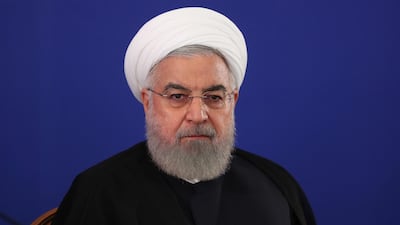A war with Iran would be the "mother of all wars," Iranian President Hassan Rouhani said in a speech broadcast live on state television.
He said shipping could not be safe in the Strait of Hormuz, the vital waterway through which a fifth of the world's oil supplies is transported.
Tensions have risen between Iran and the West since last year when the United States pulled out of an international agreement which curbed the Islamic republic's nuclear programme in return for an easing of economic sanctions on Iran.
"Peace with Iran is the mother of all peace, war with Iran is the mother of all wars," Mr Rouhani said at the foreign ministry in a speech which also praised Foreign Minister Mohammad Javad Zarif after the US imposed sanctions on him on July 31.
If the United States wants to have negotiations with Iran then it must lift all sanctions, Mr Rouhani said, noting that Iran must be allowed to export oil.
Fuelling fears of a Middle East war with global repercussions, Iran's Islamic Revolutionary Guard Corps seized British tanker Stena Impero near the Strait of Hormuz in July for alleged marine violations, two weeks after British forces captured an Iranian oil tanker near Gibraltar accused of violating sanctions on Syria.
"A strait for a strait. It can't be that the Strait of Hormuz is free for you and the Strait of Gibraltar is not free for us," Mr Rouhani said.
It comes as Iran unveiled three precision missiles on Tuesday amid continued tensions in the Gulf, and the UK joined a US-led maritime mission to protect merchant vessels in the Strait of Hormuz.
The UK government said they would be heading the operation and had offered to lead one of the mission’s maritime task groups.
Security experts say the decision demonstrates its naval weaknesses and renewed subservience to the US.
Dr Edward Wastnidge, lecturer in Politics and International Studies at the Open University, said: “The UK's joining of the US navy mission in the Gulf is a clear illustration of Britain's continued subservience to the whims of US foreign policy in the Middle East.
“It shows how UK foreign policy continues to be in a state of disarray and subject to the tumult of the domestic jockeying for power in the lead up to and aftermath of Boris Johnson's elevation to Prime Minister.
“Two weeks ago we were hearing from now former Foreign Minister Jeremy Hunt about how the UK would not join such a US-led anti-Iran coalition. The attempts by the UK to corral a coalition of European nations as an alternative amounted to nothing. Now, Johnson's team clearly want to demonstrate their commitment to US interests in the region, which shows just how weak the UK has become.
“The UK will likely commit its threadbare resources as a means of appeasing its US ally as it scrambles to find a place for itself in the world following its convoluted divorce from the EU.”
The UK’s bid to create a European naval force was also destined to fail, according to maritime experts.
“The UK call for a European-led response was always likely to come up against the reality that European navies would not be able to respond quickly, on top of which there will have been some political hesitation in some capitals,” said Nick Childs, senior fellow at the International Institute for Strategic Studies.
"The decision is a reflection of the fact that the US has by far the most capable forces in the region to lead a maritime security coalition, particularly in terms of surveillance and reconnaissance.
"And both the UK and US probably see a greater urgency in the situation than other potential contributors.
“The US and UK forces in the region should be able to co-ordinate closely in order to provide wider and more flexible cover than each operating individually, although exactly what the division of responsibilities and rules of engagement are remain to be seen.”

